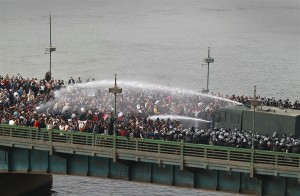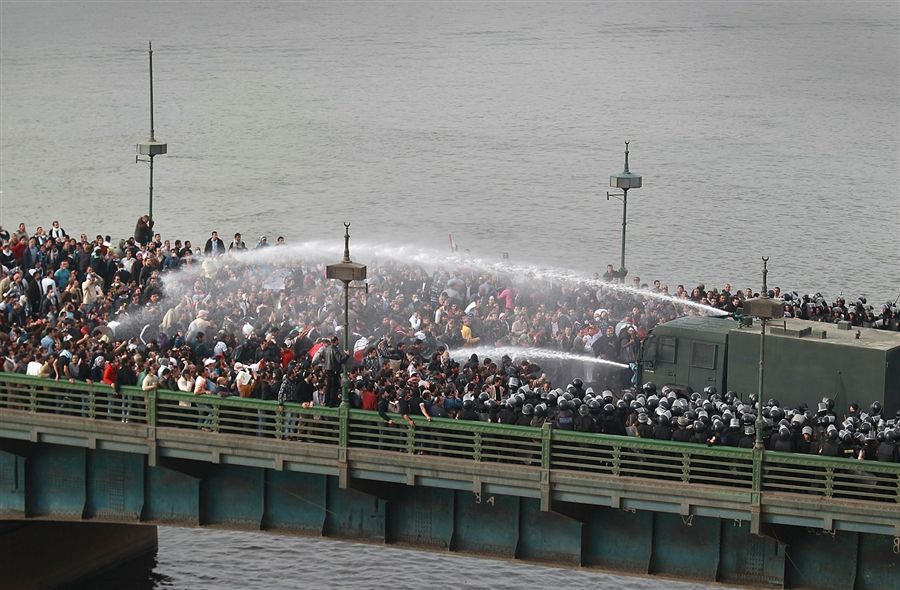
(AFP File Photo / Peter Macdiarmid)
The Egyptian government should establish an effective, independent fact finding committee to investigate the unlawful mass protester killings since January 2011, according to a statement issued by Human Rights Watch, Amnesty International and 11 other NGOs.
The organisations which signed the statement include The Egyptian Initiative for Personal Rights (EIPR), Al- Nadim Center for Rehabilitation of Victims of Violence and Torture, The Arab Network for Human Rights Information (ANHRI), The Association of Freedom of Thought and Expression (AFTE), Warkom Bel Taqrir campaign, The International Federation for Human Rights (FIDH) and he Egyptian Center for Economic and Social Rights (ECESR).
The statement listed 13 major incidents in which security forces have killed protesters since January 2011, including the incidents of the 25 January Revolution, Maspero incidents of October 2011, Mohamed Mahmoud street clashes in November 2011, cabinet clashes in December 2011, clashes outside Port Said prison in January 2013, Republican Guard Club and Al-Nasr road clashes in July 2013, the dispersal of Rabaa Al-Adaweya and Al-Nahda sit-ins on 14 August, Ramses Square clashes on 16 August and the 6 October 2013 clashes. According to the organisations’ count, at least 2,329 people have died in these incidents.
According to the statement, the prosecution has “selectively” investigated only protesters on charges of assault after clashes with security forces and ignored the “steadily rising death toll among protesters”.
The statement recommended that Prime Minister Hazem El-Beblawi should establish, by decree, a fact-finding committee that is independent of both the government and military, and should have the authority to summon witnesses to testify, including former and current state officials. The committee should have the powers of subpoena, search and seizure, and should use information from a variety of sources, including public archives, medical and morgue records, reports by human rights organisations and previous fact-finding committees, including the Fact-Finding Committee established by ousted president Mohamed Morsi in June 2012, whose results have yet to be made public officially.
The NGOs’ recommendations also include the committee exploring the roles of senior level officials in the killings, their accountability for instructing such killings, their failure to ensure the safety of the protesters and their alleged inability to control their subordinates’ use of force. It should also examine the presence of “any policy to kill protesters”.
“The prosecutor general’s office should open an impartial and credible investigation into allegations of unlawful killings by security forces, while ensuring that sensitive information is not tampered with and that the officials suspected of wrongdoing are suspended from their duties for the duration of the investigation,” the statement added.
Hassiba Hadj Sahraoui, Middle East and North Africa deputy director at Amnesty International, said: “Victims of human rights violations, as well as society at large, have a right to know the whole truth about past human rights violations.”
“After the unprecedented levels of violence and casualties seen since the ousting of Morsi, investigations must provide real answers and cannot be another whitewash of the security forces record. Egypt’s authorities cannot deal with the carnage through PR in world’s capitals, rewriting events and the locking up of Morsi’s supporters,” Sahraoui said
Joe Stork, deputy Middle East director at Human Rights Watch, said that it will be impossible for all of Egypt’s people to gain trust in their new government and justice system unless they see that those responsible, including those at the highest command levels, are held accountable for the killings of protesters.
“Egyptian authorities have failed in their promise to examine the facts of these killings, much less punish those responsible; [this] does not inspire confidence in their commitment to justice and truth,” Stork added.
Egypt had previous unsuccessful attempts in establishing fact-finding committees.
In February 2011, former presidential candidate Ahmad Shafiq, who was then prime minister under former president Hosni Mubarak, set up a fact-finding committee and appointed independent commissioners to investigate the killing of protesters in January 2011. The committee publicised a summary of its findings and its recommendations in April 2011, which found that police forces had killed protesters and called for security sector reforms, but did not release the complete report.
Morsi also set up a fact-finding committee in July 2012 to investigate violence against protesters from January 2011 to June 2012. Morsi’s decree ordered all state entities to comply with the committee’s requests for information and gave the committee the authority to review the measures taken by executive branches of government and the extent to which they cooperated with the judicial authorities. The committee finalised its report and submitted it to Morsi at the end of December 2012, but it was never made public.
The statement added that the transitional justice minister, Amin Al-Mahdy, should issue the complete fact-finding committee reports produced by fact-finding committees in February 2011 and July 2012.


